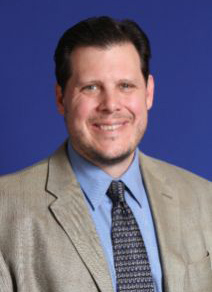'The Act of Reflection as a Means of Course Improvement' Is Conversations Series Topic
 David C. Earnest
David C. Earnest
David C. Earnest, associate professor of political science and international studies in the College of Arts and Letters, will lead the next Provost's Conversations on Teaching and Learning discussion on Thursday, April 17.
Presented by the Center for Learning and Teaching (CLT), the Office of Distance Learning and Provost and Vice President for Academic Affairs Carol Simpson, these brown bag lunch series presentations are open to all faculty members, and offer the opportunity to reflect and share about the teaching and learning process. CLT will provide light refreshments.
Earnest will speak on "The Act of Reflection as a Means of Course Improvement" at 12:30 p.m. in the Learning Commons Conference Room at Perry Library. This will be the final Conversation in this semester's series.
Earnest's research uses computational social simulation to study interstate cooperation. He has published findings in International Studies Quarterly (2008) and has written about the epistemology of computational methods in "Complexity in World Politics" (Neil Harrison, ed., SUNY Press, 2006). He is author of "Old Nations, New Voters: Nationalism, Transnationalism and Democracy in the Era of Global Migration" (SUNY Press, 2008) and co-author of "On the Cutting Edge of Globalization" (Rowman & Littlefield, 2005).
He has also published in leading journals including World Politics, Foreign Policy, International Interactions, and Globalizations. Earnest has previously taught at the George Washington University, the University of Sydney Business School and Syddansk Universitet (University of Southern Denmark).
ODU has recognized Earnest's teaching with the Robert L. Stern Award for Excellence in Teaching (2013) and the Instructional Technology Teaching Award (2006). He also is a two-time recipient of Faculty Innovator Grants (2006 and 2011) from the Center for Teaching and Learning at ODU.
In his Conversation, Earnest will discuss the teacher-as-learner. Ironically, he notes, many of those who are charged with educating the next generation of leaders have little to no formal training in teaching. (Earnest's own training consisted of a half-day seminar during graduate school.)
For those who learned with chalkboards, their limited formal training in teaching provides little guidance for recent changes in higher education. How do we learn to teach in this new environment? What practices allow our teaching to adapt, grow and improve as higher education changes? To answer these questions, Earnest will discuss the practice of reflection as an essential tool for the teacher.
"Reflection" requires more than simply reading student evaluations and thinking about one's strengths and weaknesses as a teacher. Rather, Earnest will argue, reflection requires the teacher to think about his or her place in an educational ecosystem that evolves continuously.
Because the educational ecosystem always changes, good teaching must continuously evolve and adapt as well. The teacher must consider changing student needs; new pedagogies; technologies that transform the learning space; the talents of our gifted colleagues; and our own changing personal relationships and values. The act of reflection allows the teacher-as-learner to meet and thrive in this challenging and dynamic educational landscape.
For more information about the Provost's Conversations on Teaching and Learning series, including highlights from past years' Conversations and a calendar of upcoming dates, visit the Conversations website at http://clt.odu.edu/pctl.

